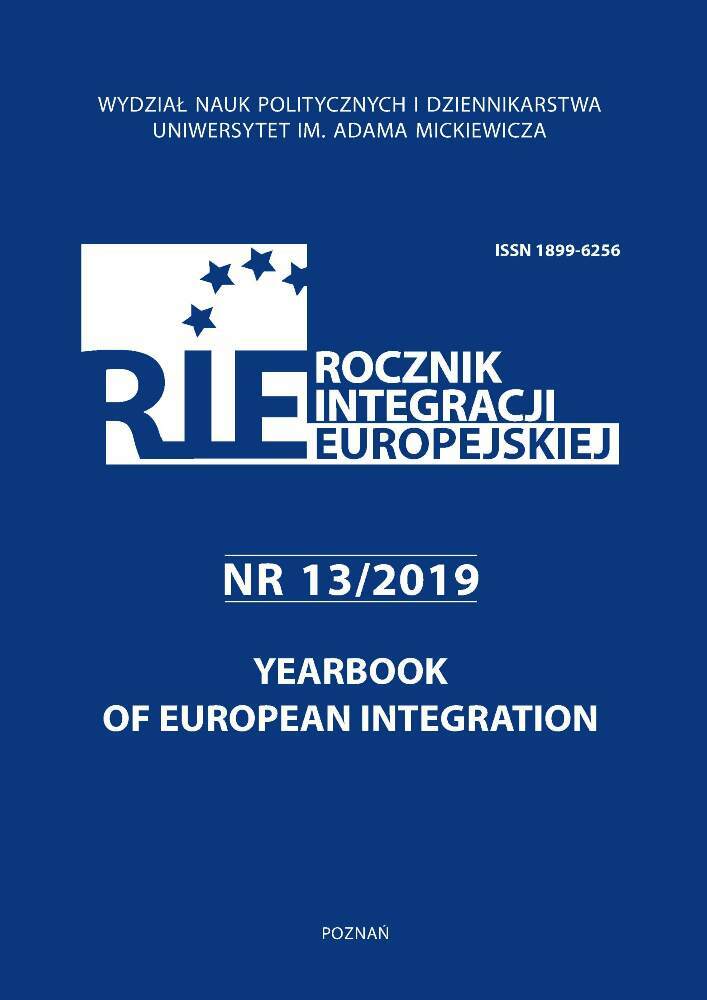Abstract
The argument of this article is based on the assumption that the Hungarian EU model and the imitative Polish EU vision are based on Euroscepticism, creating the concepts equally incompatible with Western standards of democracy and the EU mainstream views. The strong articulation of extreme opinions leads to the isolation, while in the light of liberal intergovernmentalism it is the Polish concept that undermines the relative position of that state in the EU system more than the Hungarian one. First, compared with Hungary, Poland has completely different interests based on a Russian threat and geographical location. Second, due to its size Poland could be a relatively strong player in the EU, while presentation of a radical concept weakens its role, making it impossible to act as intermediary, an honest broker or a group leader. On the contrary, the Hungarian model, based on a similar concept but applied to a small political actor, can strengthen the relatively marginal position of that state, being a beneficial way to achieve some goals in tactical games.
References
A Deeper Single Market for a More Competitive Industry in the EU, Polish Contribution to the Preparation of the EU Strategic Agenda 2019–2024, Attachment, 21 May 2019, Press Office, Ministry of Foreign Affairs, Republic of Poland, https://www.gov.pl/web/diplomacy/poland-active-in-the-discussion-on-the-future-eu-strategic-agenda-2019-2024, 25.06.2019.
A Strengthened Role of the National Parliaments for the Benefit of a More Democratic Union, Polish Contribution to the Preparation of the EU Strategic Agenda 2019–2024, Attachment, 21 May 2019, Press Office, Ministry of Foreign Affairs, Republic of Poland, https://www.gov.pl/web/diplomacy/poland-active-in-the-discussion-on-the-future-eu-strategic-agenda-2019-2024, 25.06.2019.
Bozoki A., Hegedus D. (2018), An Externally Constrained Hybrid Regime: Hungary in the European Union, “Democratization”, vol. 25, no. 7, pp. 1173–1189.
Bugaric B. (2015), A Crisis of Constitutional Democracy in Post-Communist Europe: “Lands in-between” Democracy and Authoritarianism, “International Journal of Constitutional Law”, vol. 13, no. 1, pp. 219–245.
Bustikova L., Guasti P. (2017), The Illiberal Turn or Swerve in Central Europe?, “Politics and Governance”, vol. 5, no. 4, pp. 166–176.
Buzogany A. (2017), Illiberal Democracy in Hungary: Authoritarian Diffusion or Domestic Causation?, “Democratization”, vol. 24, no. 7, pp. 1307–1325.
Csillag T., Szelenyi I. (2015), Drifting from Liberal Democracy: Traditionalist/Neo-Conservative Ideology of Managed Illiberal Democratic Capitalism in Post-Communist Europe, “Intersections. East European Journal on Society and Politics”, vol. 1, no. 1, pp. 18–48.
Csillag T., Szelenyi I. (2015), Drifting from Liberal Democracy: Traditionalist/Neo-Conservative Ideology of Managed Illiberal Democratic Capitalism in Post-Communist Europe, “Intersections. East European Journal on Society and Politics”, vol. 1, no. 1, pp. 18–48.
Digital Single Market, Polish Contribution to the Preparation of the EU Strategic Agenda 2019–2024, Attachment, 21 May 2019, Press Office, Ministry of Foreign Affairs, Republic of Poland, https://www.gov.pl/web/diplomacy/poland-active-in-the-discussion-on-the-future-eu-strategic-agenda-2019-2024, 25.06.2019.
EU-Russian Economic Cooperation Must Be Restored, November 12, 2018, Website of the Hungarian Government, http://www.kormany.hu/en/ministry-of-foreign-affairs-and-trade/news/eu-russian-economic-cooperation-must-be-restored, 25.11.2018.
Future of Europe – Debate with the Prime Minister of Poland, Mateusz Morawiecki, 4 July 2018, 2018/2729 (RSP), Legislative Observatory, European Parliament.
Gostyńska-Jakubowska A. (2016), Poland: Europe’s New Enfant Terrible?, “CER Bulletin”, no. 106.
Hungarian-Russian Relations Are Developing Again, November 22, 2018, Website of the Hungarian Government, http://www.kormany.hu/en/ministry-of-foreign-affairs-and-trade/news/hungarian-russian-relations-are-developing-again, 25.11.2018.
Karolewski I. P., Benedikter R. (2016), Poland Is Not Hungary. A Response to “Poland’s Constitutional Crisis”, “Foreign Affairs”, 21 September.
Kelemen R. D. (2017), Europe’s Other Democratic Deficit: National Authoritarianism in Europe’s Democratic Union, “Government and Opposition”, vol. 52, no. 2, pp. 211–238.
Kowal P. (2018), Orban urasta na papieża europejskiego populizmu, 30 August, https://www.tvn24.pl/wiadomosci-z-kraju,3/pawel-kowal-w-faktach-po-faktach-mowi-o-polityce-wegierskiej-orbana,865012.html, 25.11.2018.
Kundnani H. (2018), Competing Visions of Europe Are Threatening to Tear the Union Apart, “The Guardian”, 1 July.
Lengyel G., Ilonszki G. (2012), Simulated Democracy and Pseudo-Transformational Leadership in Hungary, “Historical Social Research”, vol. 37, no. 1, pp. 107–126.
Migration Policy, Polish Contribution to the Preparation of the EU Strategic Agenda 2019–2024, Attachment, 21 May 2019, Press Office, Ministry of Foreign Affairs, Republic of Poland, https://www.gov.pl/web/diplomacy/poland-active-in-the-discussion-on-the-future-eu-strategic-agenda-2019-2024, 25.06.2019.
Minister Jacek Czaputowicz on Poland’s Vision of the European Union, 18 June 2019, Press Office, Ministry of Foreign Affairs, Republic of Poland, https://www.gov.pl/web/diplomacy/minister-jacek-czaputowicz-on-polands-vision-of-the-european-union, 25.06.2019.
Moravcsik A., Nicolaidis K. (1999), Explaining the Treaty of Amsterdam: Interests, Influence, Institutions, „Journal of Common Market Studies”, vol. 37, no. 1, pp. 59–85.
Moravcsik A. (2008), The European Constitutional Settlement, “The World Economy”, vol. 31, no. 1, pp. 158–183.
Müller J.-W. (2015), Should the EU Protect Democracy and the Rule of Law inside Member States?, “European Law Journal”, vol. 21, no. 2, p. 141–160.
Nowak L. (2018), Kruche podstawy demokracji liberalnej, in: Zmierzch demokracji liberalnej?, ed. by K. A. Wojtaszczyk, P. Stawarz, J. Wiśniewska-Grzelak, Oficyna Wydawnicza ASPRA-JR, Warszawa.
Orban V. (2018a), Festrede auf der „Budapester Europa-Rede – Erinnerung an Dr. Helmut Kohl” betitelten Vortragsveranstaltung der Konrad-Adenauer-Stiftung und der Stiftung für ein Bürgerliches Ungarn, 16. Juni, http://www.kormany.hu/en/the-prime-minister/the-prime-minister-s-speeches/viktor-orbans-festrede-auf-der-budapester-europa-rede-erinnerung-an-dr-helmut-kohl-betitelten-vortragsveranstaltung-der-konrad-adenauer-stiftung-und-der-stiftung-fur-ein-burgerliches-ungarn, 20.11.2018.
Orban V. (2018b), Speech at the 29th Balvanyos Summer Open University and Student’s Camp, 28 July, http://www.kormany.hu/en/the-prime-minister/the-prime-minister-s-speeches/prime-minister-viktor-orban-s-speech-at-the-29th-balvanyos-summer-open-university-and-student-camp, 20.11.2018.
Poland Active in the Discussion on the Future EU Strategic Agenda 2019–2024, 21 May 2019, Press Office, Ministry of Foreign Affairs, Republic of Poland, https://www.gov.pl/web/diplomacy/poland-active-in-the-discussion-on-the-future-eu-strategic-agenda-2019-2024, 25.06.2019.
Poland’s Position on the Directions of the EU Climate Policy in 2019–2024, Polish Contribution to the Preparation of the EU Strategic Agenda 2019–2024, Attachment, 21 May 2019, Press Office, Ministry of Foreign Affairs, Republic of Poland, https://www.gov.pl/web/diplomacy/poland-active-in-the-discussion-on-the-future-eu-strategic-agenda-2019-2024, 25.06.2019.
Szczerski K. (2017), Utopia europejska. Kryzys integracji i polska inicjatywa naprawy, Wydawnictwo Biały Kruk, Kraków.
The EU as a Defence Actor – Strategic Effectiveness and Transatlantic Burden-Sharing, Polish Contribution to the Preparation of the EU Strategic Agenda 2019–2024, Attachment, 21 May 2019, Press Office, Ministry of Foreign Affairs, Republic of Poland, https://www.gov.pl/web/diplomacy/poland-active-in-the-discussion-on-the-future-eu-strategic-agenda-2019-2024, 25.06.2019.
Tosiek P. (2017a), „Demokracja międzyrządowa” – w kierunku rekonstrukcji polskiej koncepcji reformy instytucjonalnej UE, „Rocznik Integracji Europejskiej”, no. 11, pp. 369–381.
Tosiek P. (2017b), Polska wizja „rekonstytucji” Unii Europejskiej: nowy model integracji zróżnicowanej?, „Przegląd Europejski”, no. 3, pp. 39–56.
Uitz R. (2015), Can You Tell When an Illiberal Democracy Is in the Making? An Appeal to Comparative Constitutional Scholarship from Hungary, “International Journal of Constitutional Law”, vol. 13, no. 1, pp. 279–300.
Wykład Prezydenta RP na Uniwersytecie w Zurychu, 9 October 2018, http://www.prezydent.pl/aktualnosci/wypowiedzi-prezydenta-rp/wystapienia/art,544,wyklad-prezydenta-rp-na-uniwersytecie-w-zurychu.html, 20.11.2018.
